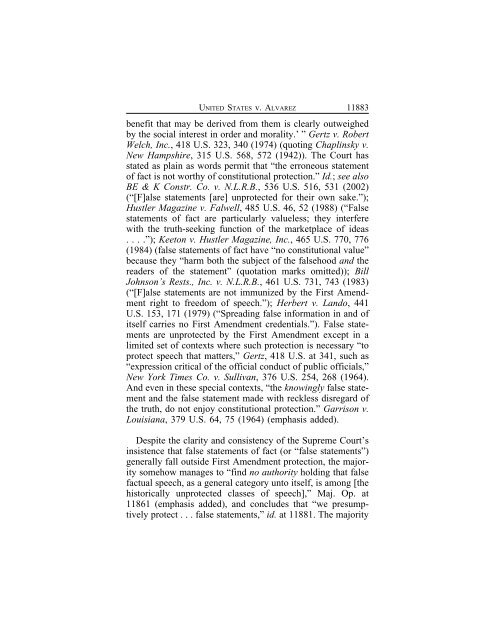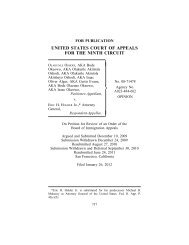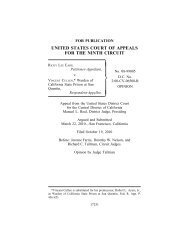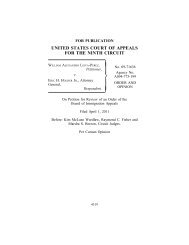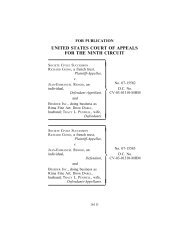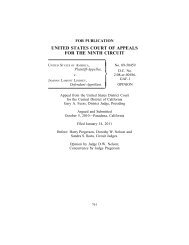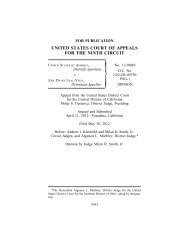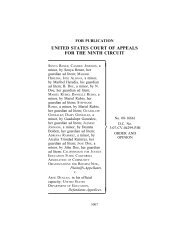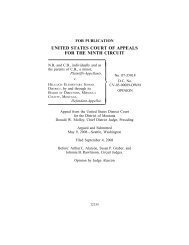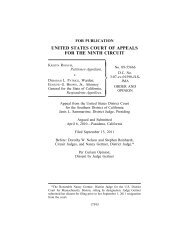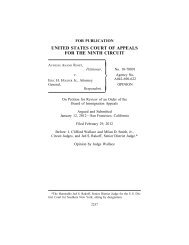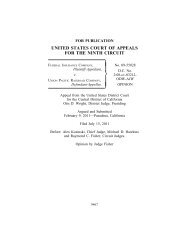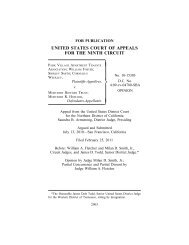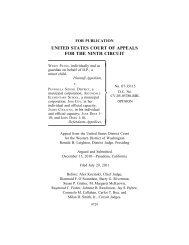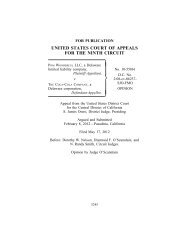USA v. Xavier Alvarez - Ninth Circuit Court of Appeals
USA v. Xavier Alvarez - Ninth Circuit Court of Appeals
USA v. Xavier Alvarez - Ninth Circuit Court of Appeals
Create successful ePaper yourself
Turn your PDF publications into a flip-book with our unique Google optimized e-Paper software.
UNITED STATES v. ALVAREZ<br />
11883<br />
benefit that may be derived from them is clearly outweighed<br />
by the social interest in order and morality.’ ” Gertz v. Robert<br />
Welch, Inc., 418 U.S. 323, 340 (1974) (quoting Chaplinsky v.<br />
New Hampshire, 315 U.S. 568, 572 (1942)). The <strong>Court</strong> has<br />
stated as plain as words permit that “the erroneous statement<br />
<strong>of</strong> fact is not worthy <strong>of</strong> constitutional protection.” Id.; see also<br />
BE & K Constr. Co. v. N.L.R.B., 536 U.S. 516, 531 (2002)<br />
(“[F]alse statements [are] unprotected for their own sake.”);<br />
Hustler Magazine v. Falwell, 485 U.S. 46, 52 (1988) (“False<br />
statements <strong>of</strong> fact are particularly valueless; they interfere<br />
with the truth-seeking function <strong>of</strong> the marketplace <strong>of</strong> ideas<br />
. . . .”); Keeton v. Hustler Magazine, Inc., 465 U.S. 770, 776<br />
(1984) (false statements <strong>of</strong> fact have “no constitutional value”<br />
because they “harm both the subject <strong>of</strong> the falsehood and the<br />
readers <strong>of</strong> the statement” (quotation marks omitted)); Bill<br />
Johnson’s Rests., Inc. v. N.L.R.B., 461 U.S. 731, 743 (1983)<br />
(“[F]alse statements are not immunized by the First Amendment<br />
right to freedom <strong>of</strong> speech.”); Herbert v. Lando, 441<br />
U.S. 153, 171 (1979) (“Spreading false information in and <strong>of</strong><br />
itself carries no First Amendment credentials.”). False statements<br />
are unprotected by the First Amendment except in a<br />
limited set <strong>of</strong> contexts where such protection is necessary “to<br />
protect speech that matters,” Gertz, 418 U.S. at 341, such as<br />
“expression critical <strong>of</strong> the <strong>of</strong>ficial conduct <strong>of</strong> public <strong>of</strong>ficials,”<br />
New York Times Co. v. Sullivan, 376 U.S. 254, 268 (1964).<br />
And even in these special contexts, “the knowingly false statement<br />
and the false statement made with reckless disregard <strong>of</strong><br />
the truth, do not enjoy constitutional protection.” Garrison v.<br />
Louisiana, 379 U.S. 64, 75 (1964) (emphasis added).<br />
Despite the clarity and consistency <strong>of</strong> the Supreme <strong>Court</strong>’s<br />
insistence that false statements <strong>of</strong> fact (or “false statements”)<br />
generally fall outside First Amendment protection, the majority<br />
somehow manages to “find no authority holding that false<br />
factual speech, as a general category unto itself, is among [the<br />
historically unprotected classes <strong>of</strong> speech],” Maj. Op. at<br />
11861 (emphasis added), and concludes that “we presumptively<br />
protect . . . false statements,” id. at 11881. The majority


